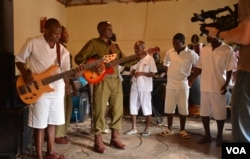Malawi has begun moving female inmates from prison facilities they shared with male prisoners. Authorities say the transfer to female only prisons is intended to place the women in an environment more conducive to their well-being.
The more than 20 prisons in Malawi are categorized as maximum security and medium security, offering various correctional programs for inmates.
Authorities, however, say those facilities were not built with women in mind.
Chimwemwe Shaba, a spokesperson for the Malawi Prisons Service, said that correctional programs "like formal and informal education, vocational training and others were biased towards men because of the structural design of the prisons, which are gender insensitive. And they made it impossible to mix the female and male prisoners so that they could equally benefit from their programs.”
Shaba said the workshops are very close to male cells, where women prisoners do not dare go for fear of being bullied or verbally harassed.
The spokesperson also said that the general prisons do not provide a conducive environment for women for their education. As a result, only male inmates advance in their prison educations.
In 2020, Malawi temporarily put female prisoners in isolated jails to slow the COVID-19 pandemic and prevent incoming prisoners from infecting the women and their babies.
"Because of that, some of them expressed interest in pursuing formal education and one of them managed to do well," Shaba said. "Now, you would see that it was like a coincidence, but the results were so positive. So that’s why we are saying, ‘No, if we design programs for them and we give them a conducive environment,’” they can succeed.
Shaba said that of 412 female prisoners in Malawi, 59 have so far relocated to an all-female prison known as Kachere, formally used as a rehabilitation center for juveniles, in central Malawi.
"It means that all the school blocks will be used by female prisoners and that we have already started sending competent teachers who are officers to make sure that they provide quality education to this female prison,” the spokesperson said.
Complicating visits
Victor Mhango, executive director of the nongovernmental Centre for Human Rights Education, Advice and Assistance, which advocates for the welfare of prisoners, said he welcomed the relocation of the female prisoners but feared that the move would end some family visits.
“Many prisoners are taken to prisons close to their area," he said. "But in this case, it will be like a prisoner from Chitipa [district] will be kept in Mzuzu [city]. It means that it will be difficult for their relations to go and see her. I think that will be a challenge, but otherwise, the idea is good.”
National prisons spokesperson Shaba acknowledged the concern, saying currently only three facilities have been selected for the all-female prisons.
He said plans are under way to have as many female prisons as possible across the country, which would help reduce distances for family visits.





